Vitamin B5 Deficiency and The Fatigue Factor
One of the rarest forms of vitamin deficiency is that involving low levels of Pantothenic acid, or vitamin B5. If you suffer from eating disorders or have substance abuse issues, however, vitamin B5 deficiency can pose a real threat to your health and lead to debilitating fatigue.
Among all the B vitamins, pantothenic acid remains one of the most obscure in the minds of the average person. While they hear much about thiamin and B12, little mention is ever made of problems related to any sort of deficiency with vitamin B5. No doubt, that has to do with how rare the condition is. Even so, there are groups of people susceptible to low levels of this critical vitamin, so a proper understanding of its role in the body is essential for anyone suffering from fatigue.
What is Vitamin B5 and How Does it Benefit You?
The vitamin designated as B5, or Pantothenic acid, is still another of those B-complex vitamins so essential for the adrenals, the nervous system, and the body’s energy maintenance. In the right amounts, this water-soluble nutrient helps the body metabolize all three macro-nutrients: proteins, fats, and carbohydrates. It also helps to break fatty acids down into usable form, and aids in maintaining skin health.
Because it works in conjunction with other vitamins to metabolize macronutrients and convert them to energy, a lack of pantothenic acid can cause a reduction in energy levels. This can lead to fatigue that can become chronic if it is not addressed in a timely manner. It is rare that vitamin B5 deficiency occurs on its own, however. As a general rule, when pantothenic acid levels are low there is typically a deficiency with one or more of the other B vitamins as well.
How Do You Know If You Suffer From B5 Deficiency?
The hard part about dealing with this vitamin is recognizing when a deficiency is present. When there is an insufficient amount, patients can suffer from burning sensations in the extremities, sleeplessness, head pains, and fatigue. Unfortunately, these are also symptoms associated with other conditions, so doctors sometimes struggle to identify vitamin B5 deficiency in their patients.
As a general rule, however, you should only tremendously concerned about the possibility of a pantothenic acid deficiency if you suffer from a number of specific ailments, or have a diet that is lacking in even the basic nutritional requirements. For example, people who suffer from anorexia are often among the most likely victims of this deficiency, since they receive very few nutrients of any kind. In like manner, alcoholics often suffer a lack of Pantothenic acid, as well as deficiencies in a number of other essential vitamins and minerals. In addition, there are rare instances where a person simply cannot absorb the vitamin B5 he or she needs due to a digestive condition known as malabsorption syndrome.
Though this deficiency can result in fatigue, not all cases of fatigue involve vitamin B5. However, if you suffer from a combination of the following symptoms, then you may want to consult with your doctor about a possible deficiency:
- Fatigue, and general weakness
- A decrease in your appetite
- Pain in your abdominal region
- Cramps in your muscles
- Unexplained mood swings
- Tingling in your arms, legs, feet, or hands
- Any of the symptoms associated with hypoglycemia
How to Diagnose B5 Deficiency
Though it is possible to test for this deficiency, the most accurate tests are extremely expensive. As a result, they are typically reserved for research purposes. To diagnose low levels of B5, most doctors rely on blood tests, as well as a urine test that is conducted over the course of one twenty-four hour period. It is important to note that many doctors will simply test for other vitamin deficiencies and then treat patients with Pantothenic acid as well, since other deficiencies are often present when this vitamin’s levels are low.
Food Sources for Vitamin B5
One of the reasons Pantothenic acid deficiency is a rare occurrence has to do with its prevalence in the foods we eat. While it is not found in sizeable amounts in any food type, it is present in small quantities in many food types. Whole grain cereals have it, as do eggs and many meats. Legumes and yogurt are also good sources. Because it is found in such common foods, most cases of deficiency are related to malnutrition.
How to Supplement Vitamin B5
The recommendation for supplementation is around 5mg per day for adults and between 1.7 and 4 mg for children between the ages of one and thirteen years old. Supplements are usually in pill form.
Potential Side Effects and Interactions
At these doses, there is no danger of toxicity or serious side effects. In fact, research indicates that you would have to take about 1200 before you would even feel heartburn or nausea. However, at daily doses of about 20 mg, patients can experience diarrhea and stomach discomfort. Still, B5 remains a relatively safe supplement to take. In fact, experts consider the possibility of overdoes to be all but impossible.
Like all of the B vitamins, pantothenic acid is critical for the body’s efficient conversion of food into the energy needed to meet normal daily demands. Although it is a fairly easy vitamin to find in most foods, cooking does destroy some of those nutrients, and other health issues can sometimes limit a patient’s ability to ingest the amount needed. With the right dietary changes – and supplementation when needed – patients typically recover from the effects of this deficiency in fairly short order.
You might also be interested in:
- Vitamin B5 Deficiency. http://www.health-tutor.com/vitamin-b5-deficiency.html
- Pantothenic Acid, Vitamin B5. http://www.drweil.com/drw/u/ART03380/Pantothenic-Acid-Vitamin-B5.html
- Pantothenic Acid (Vitamin B5). http://www.webmd.com/vitamins-supplements/ingredientmono-853-pantothenic%20acid%20(vitamin%20b5).aspx?activeingredientid=853&activeingredientname=pantothenic%20acid%20(vitamin%20b5)
- Vitamin B5 (Pantothenic acid). http://umm.edu/health/medical/altmed/supplement/vitamin-b5-pantothenic-acid



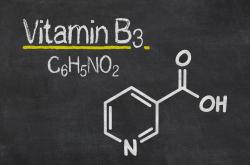
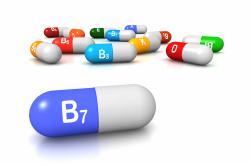
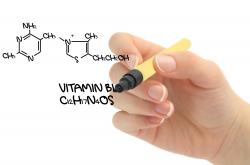

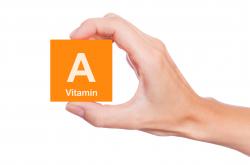
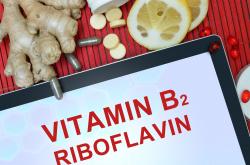









Leave a comment